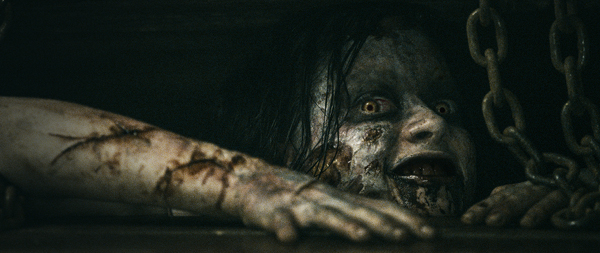
Decent modern horror remakes are often the ones able to put familiarity to use even as they willingly deviate from the source. Snyder’s Dawn of the Dead comes to mind. So too does Marcus Nipsel’s Friday the 13th , which rolled everything we’d come to expect from the franchise into a neat package while condensing the original film to a scant tag at the beginning.
For all intents, I should love Fede Alvarez’ Evil Dead remake. I don’t, far from it; but I know I should. For meeting the above criteria and many reasons more, but I just can’t bring myself to embracing this film. And that’s why I’ll express my qualms with the caveat that this could indeed be a film championed by the same horror-loving culture with which I consider myself a card-carrying member. Everything I share now, I share with the sincere hope that you enjoy this new Evil Dead considerably more than I did. Even if it’s not the kind of horror film I want, I realize its success can certainly open the door for a genre and intensity that’s currently underrepresented in the mainstream. That said, for everything that Evil Dead ’13 gets right, there are aspects of this film I actively and passionately loathe.
This new Evil Dead assembles itself from an interesting premise: five friends unite around one of their own, Mia, as she attempts to get off junk (ambiguous, though heroin seems a likely culprit) after an OD. Tucked away in a Tennessee cabin far removed from the luxuries of modern life, their noble efforts are soon undone by the presence of the Necronomicon, unknowingly unleashing a demonic presence into their midst.
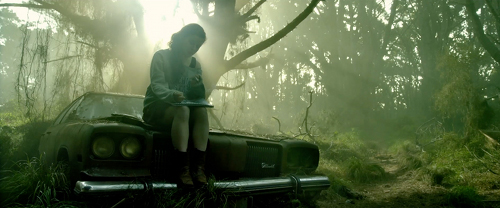
For all its missteps, the technical aspect of this film is downright awe-inspiring in parts. Alvarez is a strong, atmospheric filmmaker, sight and sound. I have no qualms with the methodology behind his style nor with Aaron Morton’s keen, eyeballs-to-the-wall cinematography. But for all the technical artistry on display, of which there’s a lot, Evil Dead’s issues are apparent from its most base, narrative level. Alvarez’ film lacks a crucial emotional element, mistaking an introductory plot point for all the substance he’ll ever need. This, in addition to two remarkably abhorrent performances, drags down what appear to be a wealth of good intentions.
I actually love that setup, especially as it’s Mia who first becomes possessed. The notion of a recovering addict held against her will, for her own safety, is something of a hot-button issue. I also think back to the story of Lisa McPherson, a scientologist with likely psychological problems who, in 1995, was held without medical treatment by the church as she mentally self-destructed, eventually dying under mysterious circumstances (dehydration a likely catalyst).
My point being that a line is crossed into a moral grey area, and the film retreats from it just as it’s getting interesting. In McPherson’s case, treatment was withheld that shouldn’t have been. But what of Mia? As her pleas to leave increase, so too does evidence of her possession, which is where narrative restraint (especially in the early going) would have provided a more emotionally resonant film. By the time Mia’s confined to the cellar, her imprisonment seems completely reasonable. And even if the audience had been in on Mia’s possession (this is, after all, an Evil Dead movie) the suggestion of something less nefarious would’ve been a welcome complexity the original film was without.
Once the evil takes hold, the script becomes a series of cheats, relying not on tantalizing but manipulating. Alvarez (who held screenwriting duties along with Rodo Sayagues and an uncredited Diablo Cody) is too preoccupied with homaging his predecessor. To that end, the entire narrative is a series of psych-outs and false red herrings as the film goes about cementing its Ash (the iconic Bruce Campbell character). And even if there isn’t a character named Ash, the entire movie builds towards the crowning of a person who’ll fill The Chin’s shoes. So much so that not one, but two people cut off their own hand in the film. And just as the film settles on a hero, the rug is pulled out from under (which, given the hero, not a bad thing). Alvarez wants to keep his audience guessing, but he lets preconceived notions cloud his judgment and run wild over his film. This is a story dictated not by what’s compelling or organic but by misguided attempts to subvert the audience.
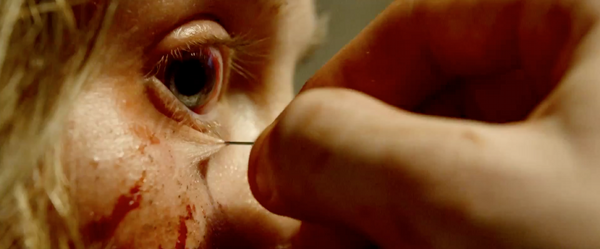
We’re left building towards a resolution without any real substance, as Alvarez’ selection is right M.I.A. for most of the film. The choice doubles as a glaringly inorganic swindle, so poor in its delivery that it completely undoes much of what’s come before and suggests that the plentiful gore we’d witnessed up to this point was not entirely finite. In Alvarez’ Evil Dead, characters can suffer third degree burns, impaled tongues and even death, only to be resurrected completely healed and ready to battle some deadites for the grand finale. Imagine Cheryl, the poor, tortured soul on the receiving end of a tree raping and demonic possession in the original, coming back and kicking copious amounts of deadite ass by film’s end. It’d have been poor form then and, aside from trying to put an unnecessary spin on a well-known arc, it’s still poor form some thirty-two years later.
Why invest in the degradation and brutalization heaped upon one character if it’s to be so thoroughly undone later on?
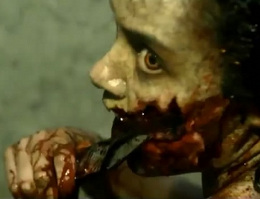 Perhaps it’s a case of taking on too much because, while the debut filmmaker homages his source material, he’s also deconstructing it with copious amounts of wholly unrestrained gore. This is undoubtedly one of the bloodiest theatrical US releases ever witnessed, and the astounding disregard for the human body is awe-inspiring. The effects work, presented in dazzling combinations of practical and CG, is where I find my true appreciation for this effort. Alvarez and WETA employ some ingenious trickery in their highly exploitative labor. The downside of going completely overboard is that all this violence becomes exhausting, and you’re worn out long before the third act. Even if you’re prone to wincing, you’re likely to be completely desensitized by conclusion. Especially when Alvarez literally rains blood over the end battle. It’s compelling stylistically, but serves no greater purpose or reasoning other than they thought it’d look cool: story serving visuals.
Perhaps it’s a case of taking on too much because, while the debut filmmaker homages his source material, he’s also deconstructing it with copious amounts of wholly unrestrained gore. This is undoubtedly one of the bloodiest theatrical US releases ever witnessed, and the astounding disregard for the human body is awe-inspiring. The effects work, presented in dazzling combinations of practical and CG, is where I find my true appreciation for this effort. Alvarez and WETA employ some ingenious trickery in their highly exploitative labor. The downside of going completely overboard is that all this violence becomes exhausting, and you’re worn out long before the third act. Even if you’re prone to wincing, you’re likely to be completely desensitized by conclusion. Especially when Alvarez literally rains blood over the end battle. It’s compelling stylistically, but serves no greater purpose or reasoning other than they thought it’d look cool: story serving visuals.
And even if I can forgive weak narrative (the original is no Godfather) and effects porn overkill, Shiloh Fernandez’ harmful performance as David, Mia’s brother, is intolerable. Alvarez and company bet on the wrong horse, resting most of the film on the actor’s shoulders even as Fernandez is exceedingly unprepared for that responsibility, giving a vacant, dead-behind-the-eyes routine that often leaves scenes with the opposite effect as intended. His delivery gets to a point where every scene he survives, becomes a trying one. Considering the direction Alvarez ultimately takes the film, the reliance on David is downright confounding.
And yes, the performances in the original Evil Dead were something less than commanding. But considering the limited means Raimi compiled his film from, it’s more forgivable than Fernandez or even Lou Taylor Pucci’s equally unpleasant Eric.
The women fare considerably better. Jane Levy builds a commanding performance around Mia, a character I liked even as I disliked what became of her. Jessica Lucas of Cloverfield fame owns the film’s best horror sequence while Elizabeth Blackmore is more than game as the comically deadening Natalie. Their showmanship makes their male-counterparts look all the more incapable, as three solid performances are sullied by two awful ones.
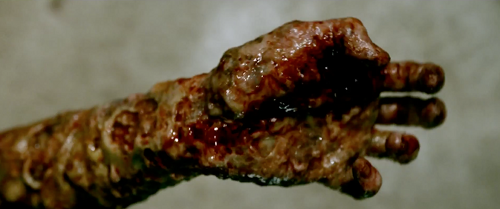
After the great unpleasantness of Texas Chainsaw 3D, I wondered what it’d take to make horror relevant again, give it back its bite. I’d have likely envisioned something not dissimilar to Fede Alvarez’ Evil Dead. And yet, now that it’s here, I realized I’d have been wrong. Alvarez wisely operates from the aesthetic of discomfort even as he takes it a few steps too far. The discomfort served up here comes back around again, feeling completely mundane and toothless by film’s end.
Good horror shows us something we’ve never seen, and surely something we never wish to see again (though we consume it over and over because we revel in the ritual). The next game-changing horror film will come like so many before: outside of the studio system, playing off our fear of the unknown. A film that’s altogether known, with missteps all too familiar, Fede Alvarez’ debut effort holds its bleeding heart in the right place. Ironically, he never quite succeeds in making it beat.
Rating: 




Out of a Possible 5 Stars